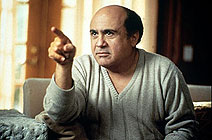|
|
|
|
Get
Shorty
|
 |
|
Wunderkind Quentin Tarantino has been candid about the influence of crime novelist Elmore Leonard on his filmmaking. Time and again Tarantino has declared to interviewers that what Leonard achieves in literature – unusual and compelling characterisations, tricky plotting based on intricate power games, an authentically seedy milieu and a complex moral tangle of actions and impulses – is what he hopes to achieve in cinema. Perhaps this acknowledged influence of Leonard on Tarantino helps explain why the new screen adaptation of Leonard's novel Get Shorty ends up looking like a poor imitation of Pulp Fiction (1994). It's the identikit of a Tarantino movie down to the last detail: film-buff banter, hip musical selections, narrative coincidences and circularities, and an ultra-cool John Travolta (who is indeed marvellous). Whatever its ultimate disappointments – particularly for Leonard fans – the film is certainly entertaining. Chili (Travolta) is a sleek, brutal loans shark in Miami who follows his serendipitous fate to Los Angeles. Dissatisfied with his profession, he figures out a way of entering the movie business as a co-producer. Chili is soon embroiled with a host of curious characters, including the dithery B movie producer Harry (Gene Hackman), no-nonsense actor Karen (Rene Russo) and absurdly pretentious star Martin (Danny DeVito). But Chili is trailing a line of gangster acquaintances as well – particularly the vicious, vengeful hood Bones (Dennis Farina). Just about everyone in this caper wants a piece of movie action, even though the tawdry reality of this world falls very short of the glamour idealised on the big screen. The film insistently draws our attention to the humorous parallels between criminal business and the movie business – borrowing, along the way, a number of by-now familiar satirical jibes from Altman's The Player (1992). Nothing gets too deep here. The Tarantino-style clinches – where a brittle, jokey mood suddenly changes with the eruption of a violent shooting or beating – are handled uncertainly by director Barry Sonnenfeld. None of the characters are particularly desperate, depraved or soulful. It's a film of hip, flip postures and smart manoeuvres; although people die, we never feel the ethical weight of these split-second power games. It is hard to get a fix on Sonnenfeld as a filmmaker. His Addams Family movies (1991 & 1993) aped the outlandish, cartoon style of Sam Raimi and the Coen brothers. For Love or Money (aka The Concierge, 1993) was a high-key romance with a slightly tough edge, in the vein of Barry Levinson, Lawrence Kasdan or (further back) Billy Wilder. Now Sonnenfeld tries his hand at copying Tarantino. Yet Get Shorty is Tarantino without the outrageousness or drive. There is a laborious, sluggish, step-by-step quality to the narrative patterning here. Key lines of dialogue ("look at me") and dramatic actions (a person breaking into a house and nonchalantly watching TV) occur and recur, passing from character to character. A Hitchcockian MacGuffin, a stash of money, sits in an airport locker, luring various players to either paradise or purgatory. As in Pulp Fiction, it is always a simple, walking movement, tracked closely by the camera – a stroll up dark stairs or through a hotel lobby – which leads the anti-heroes of Get Shorty to their unexpected rendezvous with fate. Yet Sonnenfeld is unable to lend urgency or tension to these games and gauntlets; the brooding, dread-filled, almost apocalyptic air central to so much crime fiction is missing. Ever since Elmore Leonard became a cult star of popular literature, filmmakers have been bemoaning the failure to translate his work to screen. Even that remarkable American director Abel Ferrara ended up apologising to the esteemed author after Cat Chaser (1989): "We did that film to try to get one good film out there based on Leonard's work. I don't think we helped him much." Get Shorty (like Cat Chaser) is, in the event, not a bad film. But if you want a crime story with a distinctive mood, complex moves and unique characters, your best bet is still to revisit Pulp Fiction. MORE Sonnenfeld: Men in Black II, Men in Black © Adrian Martin January 1996 |
![]()